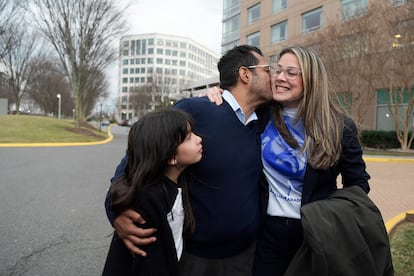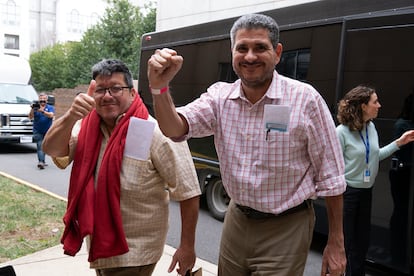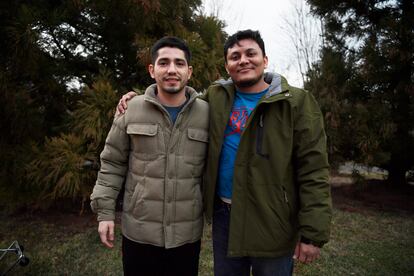Freed dissidents on Nicaragua jail: ‘They shackled us and you knew beatings were waiting in The Tunnel’
The 222 political prisoners held by the Daniel Ortega regime and sent to the US have been stripped of their nationality. ‘Nobody will take being Nicaraguan away from me’


“Twenty-four hours ago, I was in the Infiernillo (Little Hell). And look at me now: in a hotel in Washington,” says Kevin Solís, one of the 222 political prisoners released early Thursday morning and deported to the United States by the dictatorship of Daniel Ortega and Rosario Murillo.
The Infiernillo, the maximum-security wing of Managua’s La Modelo prison, has the reputation of being the worst dungeon in Nicaragua. There, Solís, a law student, spent three years in solitary confinement, “in a bunk with no sunlight, with the door permanently closed. Once a day, the jailers would unlock the bolts and throw food in at us,” he tells EL PAÍS outside a budget hotel near Dulles International Airport that the US State Department has turned into a refugee center for the dissidents released by the Ortega regime.
“We were shackled when we slept. Sleeping in shackles is difficult,” the 24-year-old continues in a determined voice - “although it feels more like I’m 30 because of what I’ve been through” - he adds. “We were also shackled when the director [of the prison] came personally to pick us up. He would take us to a place they call “The Tunnel,” a 30-meter corridor with no windows. There, you knew beatings were waiting for you, in a place where no one listens or looks. As you are tied up, they hit you in the stomach, never in the face, so that the families don’t notice.” Solís was entitled to one phone call a month. The worst part, he says, was “the isolation” and “more so than the physical injuries, the psychological ones.”
On Wednesday night, Solís and five other prisoners were taken from the Infiernillo and put on buses. They thought they were being transferred to another prison.
Juan Sebastián Chamorro, a politician and businessman, who was serving his sentence at the equally infamous El Chipote jail, thought the same thing. “Those who know Managua know that La Modelo prison is very close to the airport. We thought we were going there, but at that moment the three buses carrying those of us coming from El Chipote turned to the right, at the Air Force base. That was when we realized we were flying out of the country. We didn’t know where we were going until we were told,” says Chamorro outside the host hotel in Washington.

According to Félix Maradiaga, one of the released prisoners with the highest political profile, whose suffering began when he decided to run against Ortega in the presidential elections, explained that the 222 dissidents signed “a document on which in a single line” they agreed to leave the country. There was no mention of what was to come next: the decision of the urgently convened National Assembly to reform article 21 of the Political Constitution, which regulates Nicaraguan nationality. From now on, according to this text, the 222 are stateless, considered “traitors to the homeland.”
Like Solís, Maradiaga discovered his Nicaraguan nationality had been revoked when he arrived at the hotel in Washington. “I don’t care what the National Assembly or the government say” says Solís. “Nobody will take being Nicaraguan away from me.” However, he does fear for those that remain behind, “like [lawyer] Urbina Lara or [retired military officer] Jaime Navarrete. The worst thing is that they are going to be beaten because now nobody will be aware of what is happening to them.”
Among those left behind is also Bishop Rolando Álvarez, who did not want to board the plane. As a result of this refusal, the religious man most critical of the Ortega regime was transferred from the location where he was under house arrest to La Modelo prison.
Maradiaga is among those exiles whose family was already waiting in the United States. His wife, Berta Valle, and their nine-year-old daughter, Alejandra, boarded another plane in the morning from Florida. The family were reunited in front of the hotel, more than three years after they last saw each other. The little girl, who was six when she last saw her father, asked Maradiaga “never again” to be separated from him.
“It has been a day of many emotions. On the plane we sang the national anthem of Nicaragua,” Maradiaga says. “It is a bittersweet situation, because leaving the nation we love with all our soul under these conditions is like a child being torn from its mother’s womb. The happiness of being able to embrace my wife and daughter is mixed with the reality that I will probably be out of Nicaragua for a while.”

Solís and his friend Denis Antonio García Jirón belong to the other group: those who have no family in the United States. Ligia Gómez, former political secretary of the Sandinista National Liberation Front (FSLN) until September 12, 2018, when she was also forced into exile and now denounces the Ortega regime in the US Congress and the European Parliament, is one of those coming to their aid. Gómez’s phone has not stopped ringing. Some of the calls come from Nicaragua, where the families of the released dissidents are looking seeking answers about their loved ones.
The airplane carrying the political prisoners landed at Dulles International shortly after 11.30 am local time. In the arrivals terminal, dozens of Nicaraguans waited for them in vain. The 222 never emerged from the gate. After several hours completing immigration formalities, they left in groups for the hotel, where State Department employees prevented journalists from entering, a veto that was later relaxed. At the hotel, the freed prisoners went through a registration process, during which they were offered the services of psychologists or translators. Family and friends gathered in a conference room.
The corridors of the hotel became a who’s who of the resistance to the Ortega dictatorship. All eyes were trying to seek out the legendary hero of Sandinismo, Comandante Dos of the revolution, Dora María Téllez, who fought alongside Ortega during the revolution against the Somoza dictatorship before becoming an opponent of the regime. Also present, among many others, were Suyén Barahona, president of the Sandinista Renovation Movement; Arturo Cruz, Ortega’s former ambassador in Washington; Víctor Hugo Tinoco, the former foreign minister; journalists Juan Lorenzo Hollmann and Miguel Mora, and Francisco Xavier Sacasa, foreign minister during the presidency of Arnoldo Alemán (1997-2002), who arrived in the lobby in a wheelchair giving a victory sign to journalists.
Others, such as Lesther Alemán, the brave student who called Ortega a “murderer” in 2018 in a moment captured in a video that went viral, seemed overcome with emotion and asked for time before attending an interview with EL PAÍS. At the end of the day Alemán, among other political prisoners, was relocated to another hotel near the airport, awaiting the arrival of his relatives, who live in California.
A new life as stateless persons awaits all of them as of February 10. They did not choose this course but at least it will be spent far away from the Infiernillo, and in freedom.
Sign up for our weekly newsletter to get more English-language news coverage from EL PAÍS USA Edition
Tu suscripción se está usando en otro dispositivo
¿Quieres añadir otro usuario a tu suscripción?
Si continúas leyendo en este dispositivo, no se podrá leer en el otro.
FlechaTu suscripción se está usando en otro dispositivo y solo puedes acceder a EL PAÍS desde un dispositivo a la vez.
Si quieres compartir tu cuenta, cambia tu suscripción a la modalidad Premium, así podrás añadir otro usuario. Cada uno accederá con su propia cuenta de email, lo que os permitirá personalizar vuestra experiencia en EL PAÍS.
¿Tienes una suscripción de empresa? Accede aquí para contratar más cuentas.
En el caso de no saber quién está usando tu cuenta, te recomendamos cambiar tu contraseña aquí.
Si decides continuar compartiendo tu cuenta, este mensaje se mostrará en tu dispositivo y en el de la otra persona que está usando tu cuenta de forma indefinida, afectando a tu experiencia de lectura. Puedes consultar aquí los términos y condiciones de la suscripción digital.








































